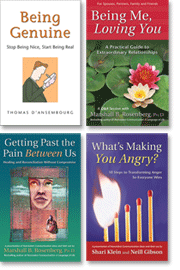Do You Want to Be Right? continued
“Asshole!!!” She says like a champion dart thrower, and then all in one motion, turns on her heal and storms out of the room. Suddenly, I felt like a hit and run victim. Shock waves of shame shot through me as the mushroom cloud of my worthlessness rose inside of me.
How could my sweet childlike honesty trigger such a verbally vile response? I decided to project the “inner critic show” going on in my head onto the ceiling. The first character on stage is my original coping mechanism, my Neurotic, who blames himself whenever there is conflict.
“Look at you, you’re pathetic. You can’t even be there for your friend in her hour of need. And you call yourself a teacher of Compassionate Communication.”
As I started to put the shattered pieces of my ego back together, the roar of righteous indignation rose in my belly. Enter my Character Disorder who blames others whenever there is conflict.
“Who the hell does she think she is? I’m not putting up with this rude, verbally abusive, boundary-invading, perpetrator behavior!” It was of some relief to have my inner critic focus on someone else for a moment.
Then my education pays off as my Therapist Complex offers the final analysis: “She is obviously suffering from a pseudo narcissistic personality disorder with paranoid borderline tendencies.”
Then (thank goodness), I remembered what Marshall Rosenberg said: “All judgments are a tragic expressions of unmet needs.”
So I started to look for the pain in my body. Oh there it is - OUTRAGE. And what are the universal human needs underneath my outrage? Respect, gentleness, safety. What else is in there, because I know anger never comes alone. There is always hurt or fear or something under it. Now I can feel it - devastating hurt and a need for reassurance that I am valued.
As I lay there giving myself empathy (i.e. paying attention to, and feeling into, what my reaction was all about), I start to feel a relieving shift in my body. I begin to wonder if my friend is experiencing the same thing - hurt and needing reassurance that she is valued.
“When I heard you call me an asshole a while ago, were you feeling angry and hurt because you were really needing reassurance that your need to be heard really mattered?” Her eyes started to fill with tears and a faint outline of a smile started to creep across her lips as she said, “It’s about time asshole.”
“Yes, I’m guessing that was painful for you and you would have liked this quality of listening earlier.” I said. “Yes,” she said, the tears now flowing freely. “But I am also relieved that you waited till you were ready to do so instead of trying to give me empathy from Hell and then resenting me.”
How beautiful to finally see the truth behind “asshole.” How beautiful to finally hear that my dear friend is in pain and wanting some reassurance from me that she mattered. This allowed me to actually enjoy my partner’s pain. I don’t mean this in the sadistic sense. I mean that there is a distinct joy in the intimacy of feeling the same feeling with another even if it is some type of pain.
There is also a sense of relief in the awareness that as I am present to my partner’s pain she is being assisted in going deeper into, and therefore through, her pain. As John Bradshaw says, “the quickest way out of pain is through it.”
I am glad I gave her my honesty (that the tone had triggered fear and that I wanted to lay there a while), because it ultimately led to a deeper level of intimacy.
Kelly Bryson MA, MFT, is a CNVC certified trainer and the author of the best selling book, Don’t be Nice, Be Real: Balancing Passion for Self with Compassion for Others. Kelly is a humorist, singer, inspirational speaker, and licensed therapist in private practice. Learn more about his work, find about his private or phone-based sessions, and buy his book at www.LanguageOfCompassion.com or by phone 831-462-EARS (3277) (most insurance accepted).
Keep learning these vital communication skills with these books and training resources:




